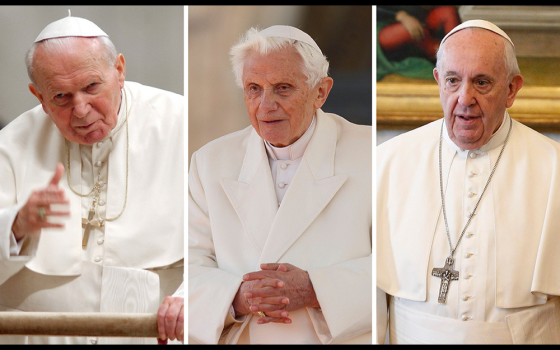Yesterday, I began my review of Robert P. Jones' The End of White Christian America. Today, I shall conclude that review and look at ways that this book, along with Nancy Isenberg's White Trash, which I reviewed earlier in the week, help us think through the deeper, more tectonic influences shaping this election.
Jones' turns his attention to the role gay rights issues have played in the recent history of white Christian America, at least among its more evangelical and politicized branch. Although LGBT Americans are a sliver of the population, they have long played the role of bogeyman for Christians. As the late John Boswell showed in his seminal 1980 book Christianity, Social Tolerance & Homosexuality, only the Jews rival gays as targets of Christian dehumanization when times are tough. (Interestingly, although Jones does not note it, the same conservative, evangelical Christians who led the fight against gay rights embraced the State of Israel and banished anti-Semitism from their weltanshauung. It will take some decades, and the work of future historians, to determine if this is a significant differentiation.) Americans' attitudes towards gays were changed by three socio-cultural phenomenon. First, more and more gays came out of the closet in the 1970s and 1980s. Second, the tragedy of HIV/AIDS made all but the most hateful of souls recognize that you do not demonize people who are dying in their 20s and 30s. Third, gays and lesbians fit themselves into the narrative of equality and tolerance that characterizes the better angels of the American nature. Jones takes us through the history of the fight between gay activists and their evangelical opponents and notes that many of the same states where white Protestants still constitute a majority of the population are the same states where a majority still opposes gay marriage.
Gay marriage is now the law of the land, and Jones is less sure footed when he examines the potential responses from the Christian community to this fact. He usefully reminds us of the last ditch effort by "Evangelicals and Catholics Together" to argue that same-sex marriage was a greater "threat" to traditional marriage than the culture of easy divorce that straight folk have created all on their own. Jones then considers those like Russell Moore, of the Southern Baptist Convention, whom Jones says argue for a "conditional surrender" on gay rights, admitting they lost the fight in the broader culture but seeking to carve out cultural and legal space to exercise their traditional understandings. Jones underestimates the theological challenge of mainstream Christianity coming to accept gay marriage on anything like equal terms with the traditional variety, in part, because he does not address the degree to which marriage has been secularized already in our culture. One of the reasons fewer and fewer Americans object to gay marriage is because fewer and fewer Americans get married in church in the first place.
Jones' treatment of race and religion is deft. It is one of the oddities of history that Dr. King could comment on the fact that Sunday morning is the most segregated time of the week, and all these years later, not much has changed. There are a few intentionally interracial churches, but, by and large, we mostly worship with people of the same race. And not only worship. This paragraph shows nicely how Jones takes his surveys and discerns the moral significance at stake:
America's still-segregated modern life is marked by three realities. First, geographic segregation has meant that ... most white Americans continue to live in locales that insulate them from the obstacles facing many majority-black communities. Second, this legacy, compounded by social self-segregation, has led to a stark result: the overwhelming majority of white Americans don't have a single close relationship with a person who isn't white. Third, there are virtually no American institutions positioned to resolve these persistent problems of systemic and social segregation.
It is that last that points to a much-needed role for the churches. I do not have to start regularly attending a Gospel Mass, and my black friends do not need to attend Latin Mass every Sunday. But, the church must become a venue for cross-racial friendships, not least because the growth of the Hispanic community, with its higher rate of interracial marriage, makes the creation of such a venue more likely.
Jones then does something I dislike intensely. He introduces a concept drawn from psychology, Kubler-Ross' stages of grief (not even from social psychology), and uses it to describe the attitudes of white Christian America as it witnesses its own loss of cultural hegemony. The history he relates is interesting: for example, the emergence of a conservative rear guard in the white Christian mainline in the form of the Institute on Religion and Democracy (IRD), but if his psychological framing were correct, the conservatives in the mainline churches should not be the only ones expressing anger. Jones also makes an interesting assertion, contra the IRD crowd, when he writes "the roots of mainline Protestantism's institutional woes are not to be found primarily in theological soil." Where are they to be found?
Most importantly, Jones offers this quote from an unnamed Methodist minister, cited by IRD president Mark Tooley: "The decline is indeed deserved and self-precipitated. ... Mainline Protestantism lost its way when it forgot how to balance being American and being Christian, choosing American individualism and self-made spirituality over classical Christianity." The quote is more than a little interesting. A case could be made that the conflation of Americanism and Christian belief was precisely what happened in the mid-century heyday of mainline and white evangelical Protestantism. Let us consider the object of so much nostalgia, the 1950s: What were they really about if not mass consumer affluence and civic religion, as if Jesus had died to make America great and to bring a washer and dryer, if not eternal salvation, into every home?
Here, we go back to Isenberg. If the principal failing of her book was that she essentially ignored religion, the principal failing of Jones' tome is that he similarly discounts economics. I am more inclined to forgive him than her: The extensive influence of Marxist historians for too long convinced us that the most important motivating factors in life were economic, so Jones is balancing the scales. (And, while economics are not the only, or even always the most important, they are not negligible factors in human motivation either.) Still, it is strange to me that both writers intertwined their main themes with the related, but distinct, subject of race, and did so very persuasively and yet declined to step onto each other's turf. I would pay good money to witness a long dinner with Isenberg and Jones. They might have been able to help Hillary Clinton explain what she meant when she said that half of Donald Trump's supporters were a "basket of deplorables."
A recent article at Vox suggested that race and identity are the defining characteristics for explaining this year's election. Polls seem to suggest that education levels are the most determinative feature. I suspect that race, religion, class, and education are all important and that if we focus on one, at the expense of the others, we distort rather than reveal what is actually going on. We need to isolate issues of class and religion to study them to be sure: Only so much fits under one microscope. But, scholars and public intellectuals need to be able to describe the room in which the microscope is found. One of the best things about Isenberg's and Jones' books is that they take on large topics, over a long period of time. As noted the other day, historians have lived for too long in the shadow of Montaillou. It is great to see smart people like Isenberg and Jones proving that we can do macro-history again. You will learn a great deal from both these books, but read them both if you want to understand the interplay of class and culture that has produced an election like this.
[Michael Sean Winters is NCR Washington columnist and a visiting fellow at Catholic University's Institute for Policy Research and Catholic Studies.]


